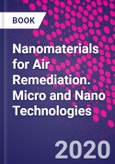Nanomaterials for Air Remediation provides a comprehensive description of basic knowledge and current research progress in the field of air treatment using nanomaterials. The book explores how nanomaterials are used in various air remediation techniques, including advanced oxidation processes, biological processes, and filtration. It also covers their combined use as nanocatalysts, nanoantibiotics, nanoadsorbents, nanocontainers, nanofiltrations and nanosensors. Major challenges to using nanomaterials for improving air quality on a mass scale, both practical and regulatory, are also presented. This is an important resource for materials scientists and environmental engineers who are looking to understand how nanotechnology is used to enhance air quality.
Please Note: This is an On Demand product, delivery may take up to 11 working days after payment has been received.
Table of Contents
1. Air quality monitoring using nanosensors 2. Smart nanosensors and methods for detection of nanoparticles and their potential toxicity in air 3. Nanocatalyst-based advanced oxidation processes 4. Nano-photocatalysis in advanced oxidation processes 5. Biotechnological applications of nanomaterials for indoor air treatment 6. Air treatment by absorption on nanoparticles 7. Nanofiltration/nanostructured membranes 8. Immobilization of hybrid nanoparticles in filtration membrane structures 9. Membranes based on carbon nanotubes 10. Antibacterial air filter using nanomaterials 11. Advanced nanomaterials for the adsorption of toxic gases 12. Nano- Metal Organic Frameworks (MOF) for gas adsorption 13. Combined cold plasma treatment and photocatalytic nanomaterials 14. Biological and physicochemical combination processes 15. Biological treatment followed by physical methods (ozonation, photolysis) 16. Future scope








